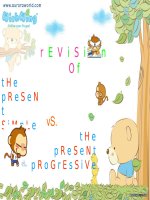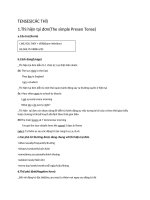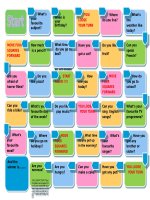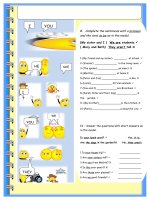The Present Simple
Bạn đang xem bản rút gọn của tài liệu. Xem và tải ngay bản đầy đủ của tài liệu tại đây (543.95 KB, 10 trang )
1. Theory:
1.1 Form:
1.1.1. Positive:
Spelling notes:
+ The usual rule: we add s
For example: work works, eat eats …
+ Verbs ending in ss, sh, ch, x, z and o add es,
instead of s alone, to form the third person singular.
I, We, You, They + verb( bare-inf)
He, She, It + verb + s/es/ies…
For example: kiss kisses, watch watches…
+ When y follows a consonant, we change the y
into i and add es.
For example: carry carries, try tries...
+ But verbs ending in y following a vowel obey the
usual rule:
For example: say says, play plays...
Exceptions: - have has
- frolic frolickes
Pronunciation of final -s/-es:
+ The pronunciation of written -s,-es is based on
the final sound of a word, before adding -s.
- If verbs end in t, k, f, p, θ, we pronounce/s/.
For example: look looks, laugh laughs …
- If verbs end in ʧ, ∫, dʒ, tʒ, s, ks we pronounce
“iz”.
For example: encourage encourages,
crash crashes…
- If not, we pronounce /z/.
For example: arrive arrives, try tries....
1.1.2. Negative:
I, We, You, They + don’t + v( bare-inf)
He, She, It + doesn’t + v( bare-inf)
1.1.3. Interrogative:
Do + I/we/you/they + v( bare-inf)?
Does + he/she/it + v( bare-inf) ?
1.2 Usage:
The simple present is used to express:
1.2.1. A habit in the present
Ex: He often makes law.
1.2.2. A fact which is always true
Ex: The sun rises in the East.
1.2.3. A fact which is true for a long time
Ex: She works in a law company.
Time expressions:
- Every (day, Sunday, morning...)
- At weekends/ nights.........
- In the ( mornings/ afternoons... )









